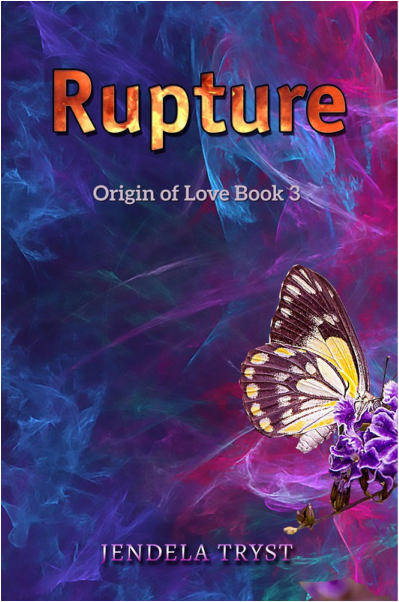Title of the work
Country of the First Edition
Country/countries of popularity
Original Language
First Edition Date
First Edition Details
Jendela Tryst, Rupture: Origin of Love Book 3. Converging Horizons, 2017, 241 pp.
ISBN
Official Website
jendelatryst.com (accessed: May 28, 2018)
Genre
Fiction
Myths
Novels
Romance fiction
Target Audience
Young adults
Cover

Picture courtesy of the Writer, from her personal website (accessed: May 28, 2018).
Author of the Entry:
Ayelet Peer, Bar-Ilan University, peerayel@taeuex.tau.ac.il
Peer-reviewer of the Entry:
Lisa Maurice, Bar-Ilan University, mauril68@gmail.com
Susan Deacy, University of Roehampton, s.deacy@roehampton.ac.uk

Picture curtesy of the Writer from her personal website (accessed: May 30, 2018).
Jendela Tryst (Author)
Tryst is an American author of Indonesian descent who publishes her books independently. She keeps her personal life private. She is very passionate about the themes of her books and has loved mythology since her schooldays. Her books focus on the love connection between mythical couples such as Cupid and Psyche or Hades and Persephone.
Sources:
Official website (accessed: May 30, 2018).
Online interview (accessed: May 30, 2018).
Bio prepared by Ayelet Peer, Bar-Ilan University, ayelet.peer@gmail.com
Questionnaire
1. What drew you to writing/working with classical antiquity?
It began when I was eight years old. My eldest sister, seven years my senior who was charged with babysitting me, told stories for entertainment (usually because our one TV was occupied by my gaming brother). When she ran out of fairytales, she pulled out her high school required reading which was a compilation of Greek myths. She summarized the stories and treated them like fairy tales. Ever since then, I was hooked.
2. What challenges did you face in selecting, representing, or adapting particular myths or stories?
The biggest challenge was creating sympathetic characters and explaining their oftentimes odd behaviors to an audience of modern critical thinkers. I’m not going to lie; I struggled to explain why Eros would not rescue Psyche as soon as he could when his mother was tormenting her. In the actual myth he seems so petty and vindictive. I also wanted Psyche to be more developed. Honestly, she is the only mortal female in Greco-Roman mythology who entered the Underworld in the flesh. The Underworld, the scariest place in the universe. She’s a pretty amazing heroine who, in my opinion, does not get enough credit.
3. Did you think about how they would translate for young readers, esp. in (insert relevant country)?
I didn’t worry too much because the characters themselves were young, but intelligent, passionate though a little naïve, struggling to gain respect from a larger, older, more jaded community. Honestly, I think those feelings reverberate in a lot of young people across all cultures. My main worry is trying to get young folks to give the book a chance. Many young readers may be turned off by the slightly academic slant of the story, which is why I wanted to focus on the romance. Honestly, who doesn’t love a great love story?
4. How concerned were you with "accuracy" or "fidelity" to the original? (another way of saying that might be – that I think writers are often more "faithful" to originals in adapting its spirit rather than being tied down at the level of detail – is this something you thought about?)
Absolutely. I have always been impressed with writers who are able to take well-known stories and create something fresh. The most common example in recent years have been fairy tales like Beauty and the Beast, Cinderella, even Sleeping Beauty in Maleficent’s point of view, all of which intrigue me. However, for me, accuracy is extremely important, otherwise the new versions just don’t seem believable. At the same time, the "spirit" of any story is very subjective, which is why this "experiment" has been so rewarding for me. I know how much Eros and Psyche the myth means to me, but it was so heartwarming to hear from so many people who shared my viewpoint or could at least appreciate it.
5. Why do you think classical / ancient myth and literature continue to resonate with young audiences?
What a great question. I believe anything that is universal and can withstand the test of time will resonate with young audiences, because young audiences are part of the human race (although some might argue with me on that. ;)) The truth is, and I’m sorry for sounding cliché, but young people are the future, and I’m something of an optimist when it comes to the future. Youth today are proving to be more intelligent, worldlier, and more compassionate than any generation before them. If anything, bringing antiquity back with all its wisdom and all its lessons so that the same mistakes don’t happen again and again is what will help young people when they eventually inherit this world.
6. Are you planning any further forays into classical material?
Absolutely. My upcoming novel, Hell’s Captive, is based on the myth of Hades and Persephone. After that, I am considering delving into the story of Atalanta and the three golden apples. I wish to do for Greco-Roman Mythology what many have already done with common fairy tales. I want to add twists to otherwise well-known stories. And for those who don’t know the stories, kindle a new interest. There is so much room for interpretation in these myths, as obvious in the many different ways they were told throughout history. It stretches the imagination greatly and I love the challenge of pushing the boundaries of the tale, yet still remaining true to the original story.
7. Do you have a background in classical education (Latin at school or classes at the University?)
I took four years of Latin in High School and one year in college, but my interest in antiquity began long before that. I chose Latin just so I could learn how to translate my favorite myths from its "purer" form.
8. What sources are you using? Scholarly work? Wikipedia? Special Internet websites? (which ones?)
For Eros and Psyche, I used a combination of Ovid’s Metamorphoses, The Golden Ass by Apuleius and also as many different versions of the myth I could get my hands on. I wanted to borrow the most common themes and stretch out the gaps that appeared in all the different versions. I know growing up, these gaps caused me great grief, because they felt so incomplete and not well thought out. Then I realized that true beauty lay in the gaps. Where the holes were, a whole other story was waiting to be told. In the end, what began as just an exercise in creativity became an entire trilogy.
Prepared by Ayelet Peer, Bar-Ilan University, ayelet.peer@gmail.com
Summary
The final installment of the Origin of Love trilogy brings the story to its fitting end. Psyche needs to face new challenges after trying to discover the identity of her husband and chasing him away. She, as well as Cupid, need to fight for their love and resolve their own trust issues. Psyche needs to confront Aphrodite who is angry about her son’s actions and prove she is worthy of Cupid and the gods.
Analysis
The author chose Rupture to sum up the trilogy; again, a violent name, referring to the great agony and calamity which befell the heroes. The title does not suggest a happy ending, yet such an ending does appear eventually. What the book deals with is indeed the rupture, the heartbreak and pain that the couple went through because of Eros’ initial deception and Psyche’s curiosity.
Again, ordinary fictional characters are wrapped up in the mythological events. The simple Lucius aids Psyche in Aphrodite’s shrine. The book returns to the recurring motifs seen throughout the series. Hades and Persephone come to the rescue of the couple, echoing their own love, which is portrayed as being to the disapproval of Demeter. This time Eros’ suffering is accentuated as well as Psyche’s, with their storylines progressing in parallel. Eros is likened to Prometheus, the Titan who stole the fire for mankind and was, by Zeus’ orders chained to a cliff while an eagle pecked at his liver in punishment. He is incarnated in Eros, who brought love (another sort of fire if we think about it) to humans and now he, too, suffers a similar punishment by Zeus and the Erinyes peck his flesh.
Eros’ consequent amnesia is used as a challenge for his love. Will he remember his true love? Is his love strong enough to withstand time and memory? At the same time, Psyche is burdened with three horrifying tasks by Aphrodite. It is Psyche’s kindness which helps her triumph and make others wish to help her. She is not afraid to stand up to Aphrodite and speak her mind. She travels to Hades and back for her love, manifesting in her actions the deepest and most profound love one can feel. It is simple vanity who brings about her fall, her wish to look more beautiful for Eros. Since beauty was the source of all evil it is only fitting that in the end beauty will almost kill Psyche. Now it is time for Eros to save his sleeping beauty. It is interesting, however, that this feminist heroine does in the end fall into such an obvious trap. This was of course an element of the original story, which the author felt obliged to maintain, but she does try to rationalize Psyche’s decision to use Persephone’s potion without making her seem vain or silly.
Again the story is endowed with symbolism. The donkey of whom Psyche was so fond is turned into a Phoenix on which Psyche tries to ride to meet Eros. The flaming immortal bird is also symbolism for the couple’s love, which was bursting like a flame in the beginning, then scorched them both, but will never die but only rise again out of the hardships they were facing.
In the climatic ending, love is on trial, literally, when Eros is being judged for his actions. Yet it is love also that saves him; or even jealousy (if Hera’s position is any indication).
This story does not only seal the trilogy, but also we see the concluding transformation of Psyche from a young maiden into a mature woman, pregnant with a daughter of her own. Love has thus matured her. The author chooses to name the young child “Joy” which is quite a naïve translation to Hedone or voluptas. Although she details the passionate love between the couple, the child is pure and thus she deliberately chose to give her a more innocent name. In the end, love triumphs all, on Olympus as well as in the underworld.
Further Reading
Maurice, Lisa, "Cupid and Psyche for Children" in Regine May and Stephen J. Harrison, eds., Cupid and Psyche: The Reception of Apuleius’ Love Story since 1600, Berlin, Boston: De Gruyter, 2020, 381–396.
Addenda
ASIN: B01N7SQ37F


